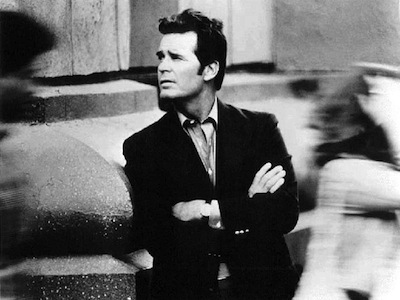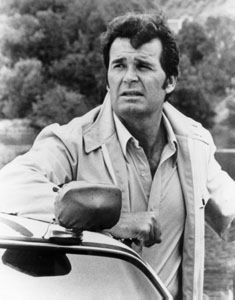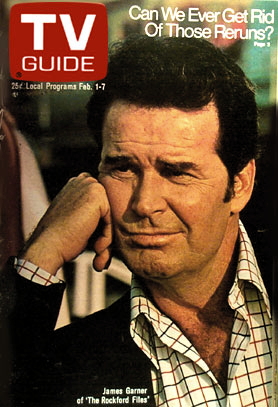 As the late critic William DeAndrea pointed out, “Surrounded by six tough guys, Mannix (or a zillion other hardboiled dicks from literature, film, radio, and television) would fight it out with them. Rockford might pretend to faint.”
As the late critic William DeAndrea pointed out, “Surrounded by six tough guys, Mannix (or a zillion other hardboiled dicks from literature, film, radio, and television) would fight it out with them. Rockford might pretend to faint.”
At a recent “meet the local writers” affair at the Lancaster (California) Public Library, high school teacher and journalist Edward Mooney was excitedly telling us about the “major motion picture” adaptation of his first novel, The Pearls of the Stone Man. Although unsure of final casting, Mooney couldn’t help let slip one of the names in contention: James Garner.
I swear, an actual hush fell over the room—a testament to the ongoing popularity of Garner. And if there’s one role, one performance, one character forever linked with Garner’s long and varied career it’s his portrayal of Jim Rockford in The Rockford Files, the enduringly popular NBC series that ran from 1974 to 1980, a character that has been referred to quite often—and I think quite correctly—as “America’s favorite private eye.”
Oh, sure, you can drag out Sam Spade or Phillip Marlowe or even Mike Hammer, but for a nation mostly weaned on the electronic boob tube that may not know Raymond Chandler from Raymond Carver, Rockford is the private eye.
I mean, get real. Has there ever been a more beloved TV shamus, or a show that’s had more impact on the genre? My sweetie gave me the long-awaited season one for Christmas, and I’ve been watching the shows in all their unedited, commercial-free glory. Once again I’m blown away by how smart and savvy and downright entertaining the show was—and how it was constantly messing with your expectations—and your heart.
Just as the late co-creator Roy Huggins had fooled around with the conventions of the TV western genre back in the 1950s with Maverick, so did he and then new-kid-on-the-block Stephen J. Cannell wreak havoc on the gumshoe genre with The Rockford Files.
 Where previous gumshoes had been mostly courageous lone knights fighting for justice and honor, obsessed with the truth, Jim was a con artist with a slick spiel and an occasionally slippery code of ethics who would rather go fishing, and had real problems with playing by the rules. An ex-con (not an ex-cop) who’d served five years in San Quentin before receiving a full pardon, he kept his rarely used gun in a cookie jar, a small press in his Firebird’s backseat to print instant business cards to go with his numerous scams, and lived in a trailer parked on the beach in Malibu. And he was no tough guy.
Where previous gumshoes had been mostly courageous lone knights fighting for justice and honor, obsessed with the truth, Jim was a con artist with a slick spiel and an occasionally slippery code of ethics who would rather go fishing, and had real problems with playing by the rules. An ex-con (not an ex-cop) who’d served five years in San Quentin before receiving a full pardon, he kept his rarely used gun in a cookie jar, a small press in his Firebird’s backseat to print instant business cards to go with his numerous scams, and lived in a trailer parked on the beach in Malibu. And he was no tough guy.
As the late critic William d’Andrea pointed out, “Surrounded by six tough guys, Mannix (or a zillion other hard-boiled dicks from literature, film, radio and television) would fight it out with them. Rockford might pretend to faint.”
Sure, we all wanted to see ourselves as some two-fisted hero, but I think, in our heart of hearts, the best most of us could count on was being Jim. Which may be why we loved him so much.
Like most of us, Jim lived in a real world, with real friends and family who stuck around week after week, people he cared for, and who cared for him. That was something that, particularly back in 1974, was rare in detective fiction—in print or film. I mean, did Mike Hammer even have a mother?
But Jim had his crusty retired trucker dad Rocky, and their solid, credible fatherson relationship soon became one of the foundations of a show which increasingly became as much about character and relationships as it was about crime or detection. Rocky fretted about Jim, and was always on his case about getting a better job—how much more real can you get?
Friends? How about Sgt. (later Lieutenant) Dennis Becker, the perpetually beleagured career cop whose friendship with Jim was as much blessing as curse? Dennis may have been the mandatory police contact, but his friendship with Jim was always more than a token plot contrivance—despite the constant arguing and bickering, it was obvious they were true pals. And Beth Davenport, the charming idealistic young lawyer (and occasional love interest) who was a sucker for hopeless causes, particularly Jim. But the greatest of all Jim’s pals was undoubtedly Angel (played to weasel-like perfection by Stuart Margolin), a hapless con artist whose hare-brained scams were always bound to fail—and bound to somehow put Jim on the hot spot.
 There were other great characters who appeared off and on throughout Rockford’s six year run (and a subsequent spate of made-for-TV movies from CBS in the 1950s), like tough-talking Gandolph Fitch (Isaac Hayes), Rockford’s hot-tempered former cellmate who could never quite get Jim’s name right; John, the former outlaw biker and disbarred criminal lawyer who gave Jim legal advice; and Meghan, the fiercely independent blind psychologist who near the end of the series seemed like Jim’s one true love. Then there was sharp-tongued hooker Rita Capkovic (Rita Moreno), determined to go straight, who came to Rockford for help several times (and ended up grabbing an Emmy for her troubles).
There were other great characters who appeared off and on throughout Rockford’s six year run (and a subsequent spate of made-for-TV movies from CBS in the 1950s), like tough-talking Gandolph Fitch (Isaac Hayes), Rockford’s hot-tempered former cellmate who could never quite get Jim’s name right; John, the former outlaw biker and disbarred criminal lawyer who gave Jim legal advice; and Meghan, the fiercely independent blind psychologist who near the end of the series seemed like Jim’s one true love. Then there was sharp-tongued hooker Rita Capkovic (Rita Moreno), determined to go straight, who came to Rockford for help several times (and ended up grabbing an Emmy for her troubles).
And how about all those fellow private eyes, each one of them stranger than the last, who kept crossing Rockford’s path? Like Richie Brockelman, the rookie investigator in tennis shoes who idolized Jim. And, of course, Lance White, the rich, elegant, and annoyingly flawless male model private eye—the walking cliché played to perfection by a then-unknown Tom Selleck?
It was a class act all the way, and there’s no doubt Garner’s persona had a lot to do with its success, but Garner, in the DVD’s far-too-skimpy “bonus feature,” really slams the nail into the hardwood when he says “the secret to all of it...is the writing.”
You won’t get any beef from me on that one: all those great characters, those crazy plots that always zigged where you expected them to zag, all that cleverness and wit—it all added up. Huggins and Cannell, between them, both individually and in collaboration, were responsible for countless memorable crime and detective shows, such as 77 Sunset Strip, The Fugitive, The Outsider, City of Angels, Tenspeed and Brown Shoe, Wiseguy, and The A-Team (okay, I didn’t say they were all good). But it’s Rockford, with its warmth, its sly revisionist charm, its charismatic lead and its lasting impact on the genre that remains their greatest achievement.
Jim, Steve, and Roy, wherever you are...take a bow. And thank you.
This article first appeared in Mystery Scene Winter Issue #93.


